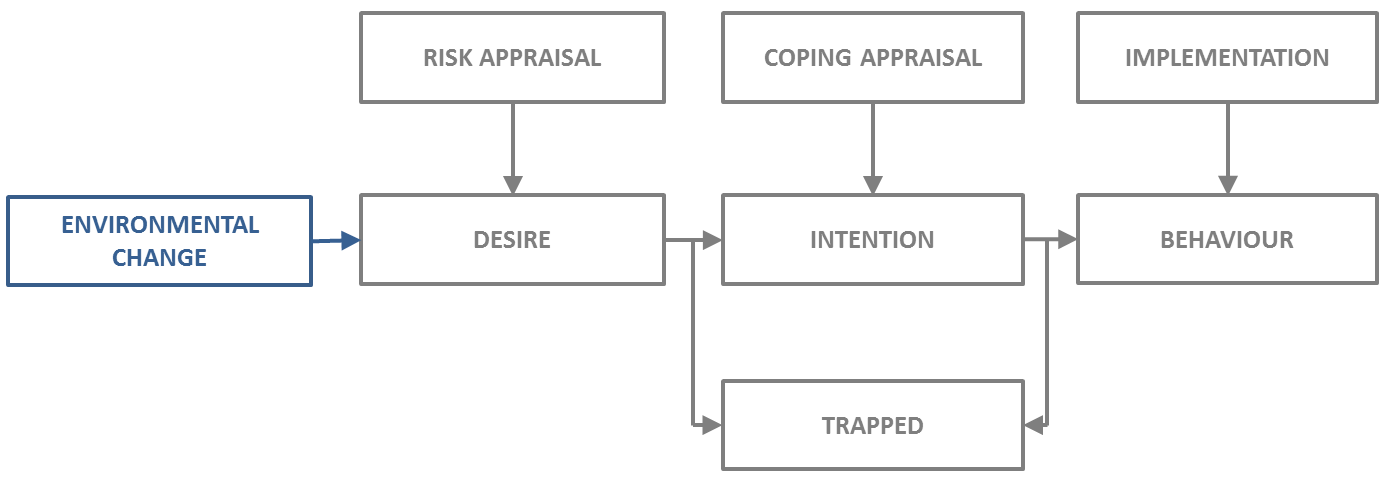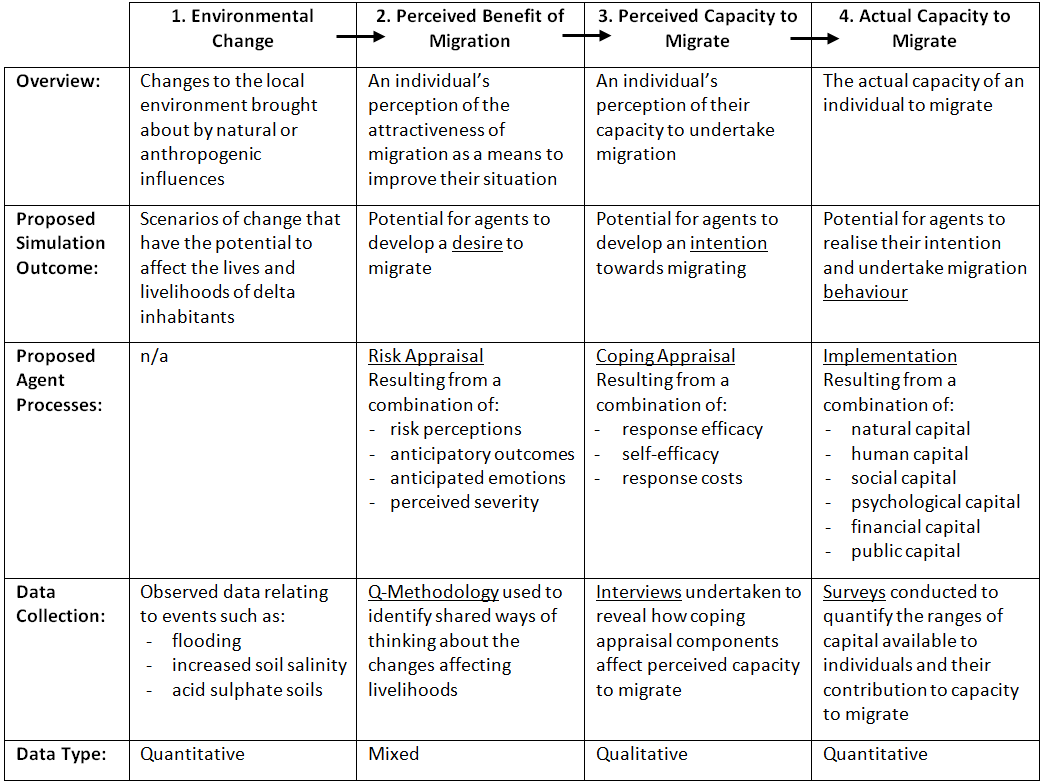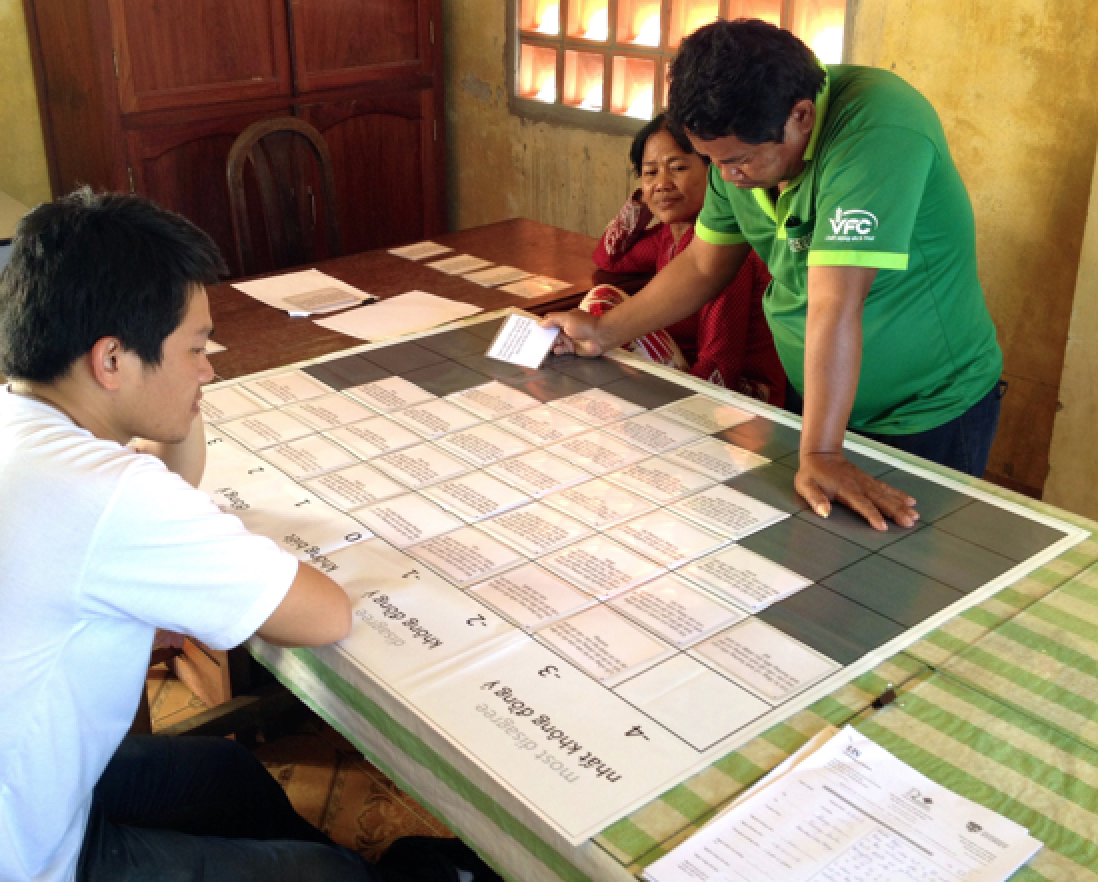 |
 |
||||||
 |
|||||||
|
|
|||||||
|
|||||||
|
|
|||||||
| Conceptual and Methodological Development | |||||||
| Because
of the complex and interconnected nature of the natural and social
systems at work in the livelihood decisions of Mekong Delta inhabitants
a simulation approach is well suited to research within this arena.
Agent-based models lend themselves well to such research by providing a
structure within which numerous levels of action and interaction
between agents and their environment may be considered. An agent-based modelling approach also permits consideration of the agency behind migration decisions made by different individuals inhabiting different circumstances, be they geographical, economic, social, psychological or otherwise. Furthermore, in a hypothetical situation where migration may be considered by many to be the ‘obvious’ response to a significant life-changing event, the potential for agent-based models to generate emergent/unexpected outcomes (more than the sum of the parts) may provide a useful methodological perspective from which to consider situations where some people choose not to migrate and others become trapped. From a conceptual standpoint, populations are proposed to become trapped when they form a desire and/or intention to move but are unable to realise such behaviour. In the context of environmental changes affecting the Mekong Delta, desire formation is proposed to be contributed to by a process of risk appraisal, intention formation by a process of coping appraisal and actual behaviour through consideration of the capacity of an individual to implement such actions. The diagram below displays a simple representation of the proposed manner in which populations may become trapped. |
|||||||
 | |||||||
Simple TRAPPED conceptual flow diagram. | |||||||
| The
conceptual approach to be adopted by this research therefore draws
upon notions of risk and coping appraisals described by Sheeran et al. (2014) with facets of Grothmann and Patt's (2005) Model of Private Proactive Adaptation to Climate Change to build upon the conceptual basis previously developed by Kniveton et al. (2011). In so doing the conceptual design incorporates components of Ajzen's (1991)
Theory of Planned Behaviour to consider the contribution of attitudes,
subjective norms and perceived behavioural controls in the
identification of whether or not migration behaviour may be realised. | |||||||
| Data Collection | |||||||
| Despite
the potential value offered by an agent-based modelling approach, such
a simulation can only be as valuable to the end-user as the process of
development and parameterisation allows. A series of comprehensive data
collection activities are thus proposed to be undertaken within the
Mekong Delta. The outcomes of these will be used to both refine the
conceptual basis of the proposed model and to parameterise the
variables it contains. In order to capture the processes at play in
migration decision-making within the delta four stages of research are
proposed (Table, below), each of which is paired with a different step
in the conceptual model and thus in the development of the final
agent-based model. Each discrete step is paired with a different means
of data collection. |
|||||||
 |
|||||||
Table: Model stages leading to each data collection component of the research. |
|||||||
| As per the information displayed in the table above, the methdology adopted by TRAPPED will be used to investigate
the role of noteworthy changes to the Mekong Delta environment (be they
naturally occurring processes or contributed to by human interventions)
upon the formation of inhabitants’ desires and intentions towards
migration as a strategy to protect or enhance livelihoods. From this
conceptual standpoint the notion of populations becoming trapped may be
readily explored through consideration of the circumstances occurring
within the delta that lead desires and intentions towards migration to
be formed but the action itself not realised. |
|||||||
 |
|||||||
| Q-Sort activity being undertaken in a hamlet of the Mekong Delta. |
|||||||
| Further information will be made available here as methodological design for the project progresses. In the meantime, please refer to the Mekong Delta section of this site for more information on the specific research context. | |||||||
This research has received funding from the European Community's Seventh Framework Programme (FP7/2007-2013) under grant agreement number PIOF-GA-2012-329589. |
|||||||
 |
|||||||
| Back to top. | |||||||
| Copyright 2015 Trapped Populations all rights reserved. | |||||||